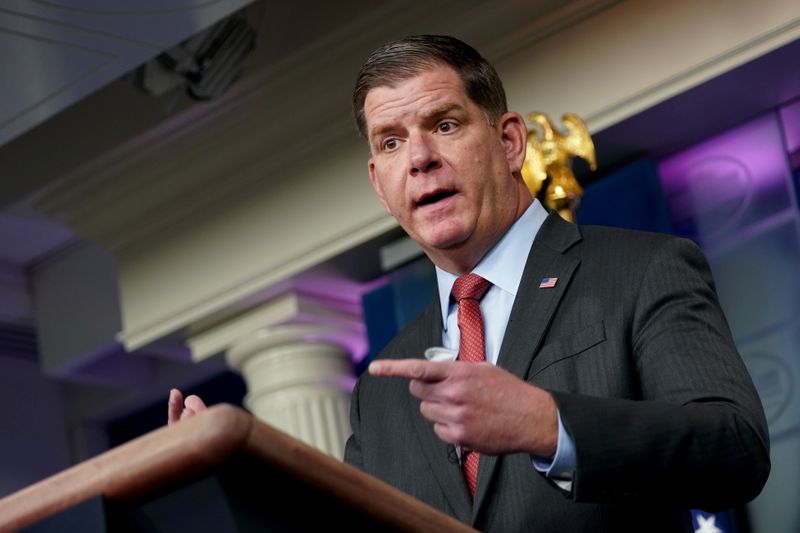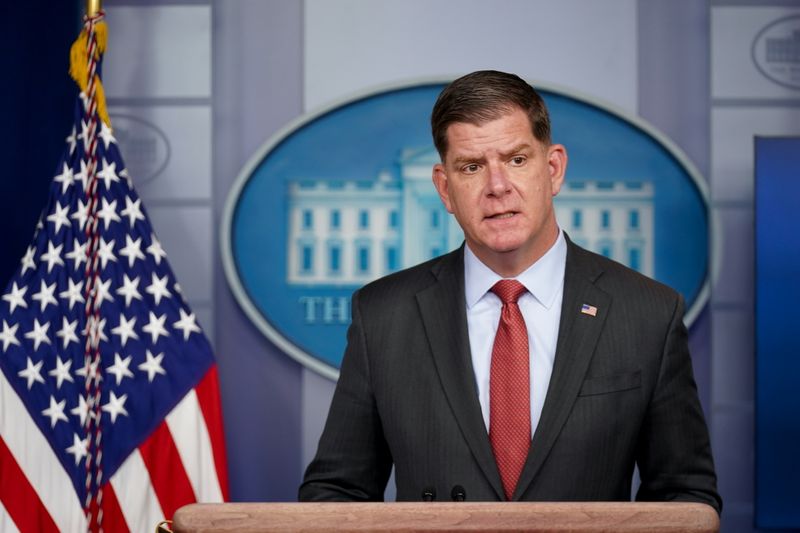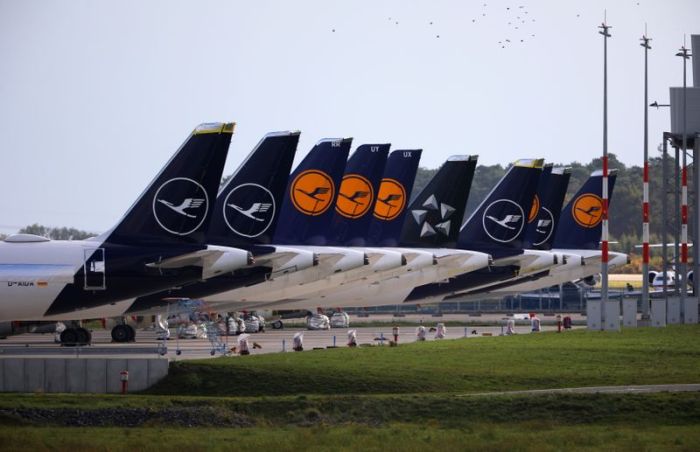WASHINGTON (Reuters) – U.S. Labor Secretary Marty Walsh’s move this week to block a rule making it easier to classify gig workers as independent contractors is just a first step in what is likely to be a long battle over how to delineate the rights of America’s growing gig army.
The rule by former President Donald Trump’s administration, which was supposed to go into effect in March, would have hampered the ability of workers at companies like Uber and Lyft to demand benefits like overtime pay.
The Labor Department, under Walsh’s leadership, is now likely to investigate how the pay and benefits gig workers receive stand up against the federal law protecting American workers, the Fair Labor Standards Act, labor lawyers, unions and former policy makers said.
Walsh, himself a former union member, told Reuters he thinks a lot of U.S. gig workers in the country deserve employee benefits, and that his department would have conversations in coming months with companies that employ them.
“These companies are making profits and revenue and I’m not (going to) begrudge anyone for that because that’s what we are about in America. But we also want to make sure that success trickles down to the worker,” he said last week.
The department’s roadmap is likely to start with announcing its intent to look at worker misclassification and then using probes to build the case for a ruling that supports protections for workers.
Any ruling would have to be reviewed by the White House and be subject to a public comment period, which could take as long as 90 days.
If the department issues a ruling, millions of gig workers could become eligible for benefits like overtime and a minimum wage.
That would almost certainly be the beginning of a battle in Washington as well as state legislatures and courtrooms across the country, the experts told Reuters.
Walsh’s position is reinforced by the FLSA as it currently stands, said Erin Hatton, an associate professor at the State University of New York at Buffalo who specializes in workforce inequities, with a focus on labor markets and the gig economy.
“The companies are really pushing to change the contours of employment law … saying workers want flexibility and this is the only way they can get it,” Hatton said.
“If employment law were to be applied to these gig workers, they would be found to be misclassified,” she said.
Companies like Uber argue that the current system defining employment and a worker’s relationship to a company is outdated.
“It forces a binary choice upon workers: to either be an employee with more benefits but less flexibility, or an independent contractor with more flexibility but limited protections,” Uber spokesman Noah Edwardsen said on Wednesday. “Uber believes that we can combine the best of both worlds.”
Uber, Lyft and Postmates declined comment on this story. Grubhub did not respond to requests for comment. The Department of Labor also declined comment.
BATTLE AHEAD
The exact number of gig workers in the United States varies widely. In 2017, the most recent government data available, the Bureau of Labor Statistics estimated that 21.4 million out of the 331-million-strong population had “contingent” or “alternative” jobs as their sole or main employment, including on-call and temporary workers as well as contractors.
Despite setbacks in Europe, gig economy companies like Uber, Lyft, Doordash and Instacart have been successful in maintaining their workers’ status as independent contractors in the United States, albeit with additional benefits.
The companies scored a decisive win in California in November, when voters in the Democratic-leaning state supported a company-sponsored ballot measure overwriting a state law that would have made their workers employees.
Similar legislation has been introduced in at least three other states – Connecticut, Massachusetts and Missouri – according to labor and gig economy experts tracking such efforts. In West Virginia, a bill was recently enacted into law.
Kathleen Anderson, a partner at the law firm Barnes & Thornburg LLP who represents employers in misclassification cases, said a new Department of Labor ruling on gig workers could give it the ability to go after companies to ensure their compliance.
If the department comes out with an “aggressive ruling,” the courts and the U.S. Congress are likely to get involved, Anderson said.
“This could be potentially devastating to a business … but to really make this stick, you have to go through (federal) legislation,” she said.
The United Food and Commercial Workers (UFCW), one of the largest unions in the country, said Uber and Lyft are already trying to “muddy the waters” by saying a new ruling would hurt actual independent contractors.
“Most gig workers are misclassified,” said UFCW International President Marc Perrone.
(Reporting by Nandita Bose in Washington; Editing by Heather Timmons and Sonya Hepinstall)


























